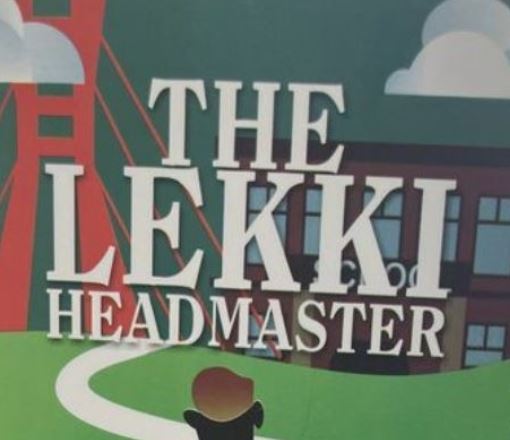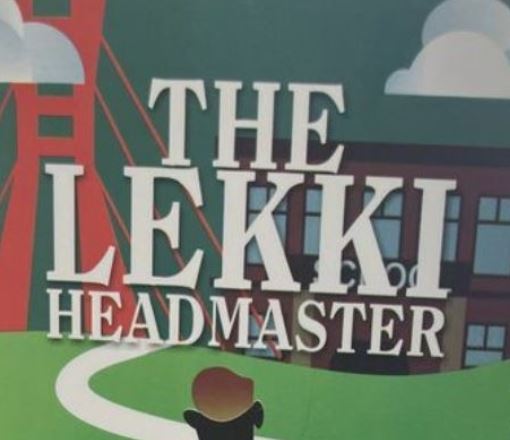Here is the chapter 4 of the Lekki Headmaster by Kabir Alabi Garba (2025 UTME novel) PDF and you can now download it for free. If you are yet to get the previous chapters (1, 2 and 3), scroll down to get them.
Lekki Headmaster by Kabir Alabi Garba is the recommended story book for the 2025/2026 JAMB exercise and it is compulsory for all UTME candidates. Therefore, it is advised that students who are writing this year’s JAMB exam should read this book.
To make things easier for all UTME students, we have decided to treat everything you need to know about this starting from the author to the last thing.
Search this blog for the setting, protagonist, antagonist, character and roles, themes and moral lessons from this novel.
SEE ALSO:
Things to Note Down as you Read this Book
- Write down the names of the characters in this novels.
- For better understanding, calm down and read it as if you’re reading a regular story. Your brain functions better when you offload it of every pressure or anxiety.
- Ensure to write the themes in this chapter.
- Note down the protagonist and the antagonist in the novel.
- Summarize the chapter in your own understanding.
Lekki Headmaster by Kabir Alabi Garba Chapter 4
A Case of Visa Denied
In his room at Adenivi Jones, Ikeja, Lagos, Bepo was about to say his night prayer when the phone rang. He was undecided, momentarily, whether to answer or proceed with the prayer. He looked at the screen to see who was calling. “Haba!” he exclaimed. “Why will this woman be calling so late?” It was Mrs. Ignatius, the parent of a student. She was one of those whom, Bepo believed, was abusing the friendliness he permitted. Some — and many, indeed — kept the relationship as official as possible.
They limited discussions to matters pertaining to fees, books, discipline, punctuality etc. But in Mrs. Ignatius’ case, she overstretched the cordiality, discussing even her marital affairs with him. Bepo racked his brain, trying to recall how it all started. He wondered how he could have allowed such personal dealings with any parent.
How could she call him in the dead of night? “He has come again o!” Mrs. Ignatius cried.
“Who, Madam?” Bepo asked, anger bottled within. And before she could respond, he added: “Madam, check your watch. I1:55am! Is it not too late for this?”
“I’m sorry, Principal. But did you know that Ibe is not yet home?” Bepo launched a silence that he knew would not be palatable to her. “For God’s sake, is it a crime to be a principal?” he asked as he momentarily pushed the phone away from the range of his mouth, then shut his robust eyes as if the answer to the question lay in the dark.
Banking on his six-footer height and prominent eyeballs, he always jovially told the students that he was created to be a principal. According to him, once he was present in any class or hall, no act of cheating could go uncaught. “If you beat my height, you can’t beat my eyes,” he would declare whenever he was supervising any exam.
The fact was that the man seemed to have every trait maximally —if not in excess.
His complexion, for instance, was as fair as that of the yellow ant that the Yoruba called salamo, while his was a voice that hardly needed a loudspeaker no matter the size of the crowd he was addressing. Bepo yet had another tale that the students often branded ‘tori’: “When I was growing up in the village and my family was working on my father’s farm, salamo used to bite my brothers and sisters especially when we were harvesting kola nut whose trees one had to often climb. But salamo never bit me because my skin bore the same colour as theirs.”
That was the extent to which Bepo could be down to earth in the school, though he combined humour and compassion with seriousness wherever required. What he, however, hated was being taken for granted or overstretched as, he believed. Mrs Ignatius was now doing. He had told her that she needed to have a lot of patience to let the wound heal. She had wronged the man, he believed. She had terribly wronged him and the man had cause to be upset. As a matter of fact, he thought, only very few men would still allow the marriage to hold in whatever form.
A year earlier, the family had been planning to relocate to London. Mr. Ibe was a manager in an oil firm, earning what a bloody’ teacher like Bepo would call an ‘armed robber’s salary. But he became fed up with the system and bought into the Japa philosophy, vowing he was ready to sacrifice all because of his children.
“My children won’t grow up here. They won’t end up here,” Ibe Ignatius had insisted. “I want them to grow up in a sane environment. I don’t want other children that are being trained outside the country now to return and lord things over my own children. Youths are leaders of tomorrow. Not all youths. Many of the ones getting Western exposure will become the leaders. I work in an international organization; so, 1 know what I’m saying.”
Apart from the sentiment in favour of the children, the economic advantage which relocation promised made it an adventure more and more people were willing to explore. It was all about dollars and pounds! All you needed to do was work in any place-for many people, just any place-earn the hard currencies and be able to send home, even $1,000 per month. Then, your life would not remain the same again.
With a dollar exchanging for as much as N1,600 in the black market, it meant you were automatically saving N1,600,000, a month. How many people in the country were able to do that? How many earned N1,600,000 — or half or even a quarter? How many, in a country where lawyers could earn as low as N15,000 monthly and some teachers were being paid the same or less as salary?
Mrs. Ignatius greatly loved the Japa idea. She had learnt tailoring and hairdressing, including the traditional Yoruba irun didi, having understood that the crafts fetched a lot of money in the UK. From the information she gathered, you could earn up to $100 braiding for a client. That, changed to Nigeria’s currency, was some N160,000. For just crafting suku or any other Yoruba braid like kojusoko and onile 80goro! While suku teased the sky with its cone-like weaving, the kojusoko braid pointed its tip towards the direction of the husband. Onilegogoro’s cone was so extroverted that it threatened to kiss the sky. While preparing for a hairdressing career in Canada, Mrs. Ignatius had learnt the bridal art a year earlier, before pulling out of her job as a clerical officer. The husband also had wound down his clearing and forwarding side business, preparatory to relocation. But something happened that scattered the plan.
When the visa processing reached an advanced stage, a DNA test conducted on their three children showed that Ignatius was not the father of one of the kids – Favour, a 15-year-old SS2 girl at Stardom. The family never remained the same again.
“What is the matter now?” Bepo asked, after his long silence, which the woman felt lasted 100 years.
“He still doesn’t believe I did not cheat on him. He is now saying Favour and I have to go.”
“Go where?”
“He says we should go and stay with Favour’s father.”
“Has Favour learnt of the entire saga? Does she know about the paternity crisis?”
“No. I don’t think so. But there is a kind of suspicion on the part of lyi, her brother.
He has been asking some disturbing questions lately. He says there must be a reason, a key reason, the embassy turned round and denied us the visas. I think he has read up why families may have visa issues.”
“So, is he suspecting a DNA crisis?”
“Honestly, I can’t say.”
There was a stretch of silence. Then, she added: “Ibe left home two hours ago, as we were discussing the matter. Principal, don’t you think he might never come back?” Bepo had no answer. He was equally set for his own relocation, believing he would soon have respite from the Ignatius’ saga.
Experience taught Bepo several lessons about running an elite school like Stardom. He hoped some of these would be relevant in his next station. He knew culture and policies differ from one country to another. But no experience was a waste. Every parent wants respect, and many seek to keep their pride. Some are rich, considerate and humble; some are rich, selfish and nasty. While all these traits reflect in the behaviour of the children, they kept the management on its toes as it pushed to achieve goals.
Bepo reminisced on some of the major incidents that defined his stay at Stardom.
He hoped that, some day, he would detail these in a book. He prayed his job in the UK would give him enough time to work on his professional biography. Among the memorable stories he would love to share was the sacking of Mr. Ayesoro, the Government teacher.
At her GRA, Lagos, home, Mrs. Mary Ladele relaxed on a sofa, watching a movie.
It was a Nollywood stuff, the type she liked — a romance. Some five months ago, she had been a devotee at Zee World, savouring Indian soaps that dripped with love scenes and intrigues. But recent visits to the cinema, where she saw about five Nollywood productions, rekindled her love for Nigerian films.
It was around 1:00pm. Her three children had all gone to bed. She was the only person in the sitting room. Her husband, Dele, was away in Abuja, where he worked as a senior civil servant. The kids could turn naughty and cook up excuses to hang around the medium-size Plasma TV, but she had mandated them to always go to bed at 10:0pm. The youngest, Bibi, was particularly notorious for wanting to flout the order, especially when her father was around. When you thought she had disappeared into the bosom of sleep, you looked in the direction of the sitting room door and saw her mischievous eyes peeping through the blinds. Then a mild battle would start between mother and daughter. It was Dele who, at times, pleaded for her or fought on her side so that she could stay awake til 11:00pm. On such nights, the mother would insist Dele wake Bibi up in the morning, knowing how tough it could be to get her on her feet.
In the movie, a female physician, Dr Ajayi, was about to conduct a Caesarean Section on Bimbo, a bosom friend of hers. It was a task the doctor was quite happy to undertake, aided by three other colleagues. Two of these were invited from a General Hospital nearby because of their expertise and experience. The third worked at Legacy Memorial Hospital, a private establishment.
Many people had reservations about government hospitals. They dreaded them because of the large crowds they attracted, which usually left doctors overwhelmed.
They were also often bogged down by inefficiency and corruption. Nevertheless, government hospitals were still famed for having some of the best consultants in the country, Therefore, regarding CS matters, many patients preferred taking the operation in public hospitals. And when they had to do so in private establishments, they opted for doctors from public hospitals on the team.
It was this synthetic arrangement Dr. Ajayi had with Bimbo. For Mrs Ladele, who had had the CS experience, watching the scene in the movie was an engaging treat. It was also good that the filmmakers chose to show the operation live. But what made the scene most captivating for Mrs. Ladele was an imminent bubble burst. Unknown to Dr. Ajayi, her husband was responsible for Bimbo’s pregnancy. As the truth was about to hit the doctor, Mrs. Ladele, enthralled and caring little about her falling wrapper, inched closer to the TV set to see how the painful truth would unfold. Just then, she heard a scream. It was Bibi.
She rushed into the room and found the girl trembling, seated on the edge of the bed.
“Mummy!” Bibi cried, as she saw her mother. Her brother and sister -Tim and
Love- had also been rudely awakened from sleep, looking bewildered.
“Bibi, what is the matter?” the mother asked, as she carried the girl and cradled her in her arms.
“It’s Mr
Wala!”
“Mr What? Who is Mr Wala?”
Jur Government teacher! He appeared to me in my dream!
With his tribal mark!”
i stepped in to lear the confusion. Bibi actually meant Mr. Ayesoro, popular in the school for the deep tribal marks he flaunted. So prominent were the incisions that students nicknamed him Mr. Owala, a derogatory Yoruba appellation for a person with wild facial marks.
I very time Bibi saw Ayesoro in school, she became scared. They met at the basketball court the previous week, when Blue House – to which she belonged — held its maiden practice, ahead of the upcoming inter-house sports competition. Bibi steamed with fright as Ayesoro, who was one of the Blue House officers, arrived at the venue. Every effort by Mr Ayesoro to allay the girl’s fear was unsuccessful Eventually, Bibi had to be reassigned to Green House, where Tim belonged.
None of the Ladeles slept again that night. Twice, Bibi’s mum tried to pet the girl into sleeping; twice the girl dreamt, crying out about Mr Wala. Mrs Ladele could hardly wait for daybreak to launch a complaint at Stardm
Worried that it could lose Bibi and her siblings to another private school, the management transferred Mr Ayesoro to Stardom Hub, the property wing of Standom Group of Companies.
END OF THE CHAPTER



